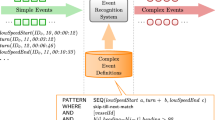Abstract
Sensor-based traffic management systems have to cope with a high volume of continuously generated events. Conventional software architectures do not explicitly target the efficient processing of continuous event streams. Recently, Event-Driven Architectures (EDA) have been proposed as a new paradigm for event-based applications. In this paper we propose a reference architecture for event-driven traffic management systems, which enables the analysis and processing of complex event streams in real-time. In particular we are going to outline the different stages of traffic event processing and present an approach based on event patterns to diagnose traffic problems. The usefulness of our approach has been proven in a real world traffic management scenario.
Preview
Unable to display preview. Download preview PDF.
Similar content being viewed by others
References
Cuena, J., Hernández, J., Molina, M.: Knowledge-Oriented Design of an Application for Real Time Traffic Management. In: Proc. Europ. Conf. on Artificial Intelligence (1996)
Dunkel, J.: On Complex Event Processing for Sensor Networks. In: IEEE 9th International Symposium on Autonomous Decentralized Systems (ISADS), Athens (Greece), March 2009, pp. 249–255 (2009)
Babu, S., Widom, J.: Continous queries over Streams. SIGMOD Record (2001)
Delic, K., Douillet, L., Dayal, U.: Towards an Architecture for Real-Time Decision Support Systems: Challenges and Solutions. In: Intern. Symposium on Database Engineering & Applications, pp. 303–311 (2001)
GARTNER GROUP, Introducing the Zero-Latency Enterprise. Research Note COM-04-37770, (June 1998)
Ossowski, S., Hernández, J., Iglesias, C., Fernández, A.: Engineering agents systems for decision support. In: Tolksdorf, P., Zambonelli (eds.) Engineering Societies in an Agent World III. LNCS (LNAI), pp. 234–274. Springer, Heidelberg (2002)
Bandini, S., Bogni, D., Manzoni, S.: Alarm Correlation in Traffic Monitoring and Control Systems: A Knowledge-Based Approach. ECAI 2002, 638–642 (2002)
Dresner, D., Stone, P.: Multiagent Traffic Management: An Improved Intersection Control Mechanism. In: Proceedings of the fourth international joint conference on Autonomous agents and multiagent systems, pp. 471–477 (2005)
Roozemond, D.A.: Using intelligent agents for urban traffic control systems. In: Proceedings of the International Conference on Artificial Intelligence in Transportation Systems and Science, pp. 69–79 (1999)
Lamport, L.: Time, clocks, and the ordering of events in a distributed system. Commun. ACM 21(7), 558–565 (1978)
Luckham, D.: Power of Events. Addison-Wesley, Reading (2002)
Zimmer, D., Unland, R.: On the semantics of complex events in active database management systems. In: ICDE, pp. 392–399 (1999)
Paton, N., Díaz, O.: Active Database Systems. ACM Computing Surveys 31(9), 63–103 (1999)
Arasu, A., Babu, S., Widom, J.: CQL A language for continuous queries over streams and relations. In: 9th Intern. Conf. on Data Base Programming Languages (DBPL), pp. 1–19 (2003)
Sharon, G., Etizon, O.: Event-processing network model and implementation. IBM Systems Journal 47(2), 321–334 (2008)
Dunkel, J., Fernández, A., Ortiz, R., Ossowski, S.: Injecting Semantics into Event-Driven Architectures. In: 11th International Conference on Enterprise Information Systems (ICEIS), Milano, Italy, May 6-10 (2009)
Bickel, P., Chen, C., Kwon, J., Rice, J., van Zwet, E., Varaiya, P.: Measuring Traffic. Statistical Science 22(4), 581–597 (2007)
Jeffrey, S., Alonso, G., Franklin, M., Hong, W., Widom, J.: A pipelined framework for online cleaning of sensor data streams. In: ICDE 2006, pp. 140–142 (2006)
Object Management Group (OMG), UML 2.0. OCL Specification (2003), http://www.omg.org/docs/ptc/03-10-14.pdf
Veloso, M., Bento, C., Câmara Pereira, F.: Multi-Sensor Data Fusion on Intelligent Transport Systems. University of Coimbra, Working Paper (2009)
Dunkel, J., Fernández, A., Ortiz, R., Ossowski, S.: Event-Driven Architecture for Decision Support in Traffic Management Systems. In: Proc. of the IEEE 11th International Conference on Intelligent Transportation Systems, pp. 7–13 (2008)
Author information
Authors and Affiliations
Editor information
Editors and Affiliations
Rights and permissions
Copyright information
© 2009 Springer-Verlag Berlin Heidelberg
About this paper
Cite this paper
Pawlowski, O., Dunkel, J., Bruns, R., Ossowski, S. (2009). Applying Event Stream Processing on Traffic Problem Detection. In: Lopes, L.S., Lau, N., Mariano, P., Rocha, L.M. (eds) Progress in Artificial Intelligence. EPIA 2009. Lecture Notes in Computer Science(), vol 5816. Springer, Berlin, Heidelberg. https://doi.org/10.1007/978-3-642-04686-5_3
Download citation
DOI: https://doi.org/10.1007/978-3-642-04686-5_3
Publisher Name: Springer, Berlin, Heidelberg
Print ISBN: 978-3-642-04685-8
Online ISBN: 978-3-642-04686-5
eBook Packages: Computer ScienceComputer Science (R0)




